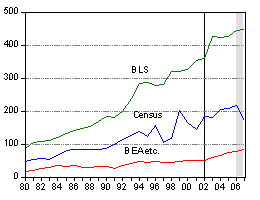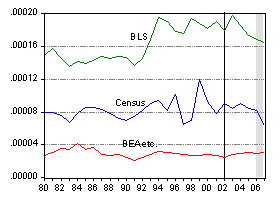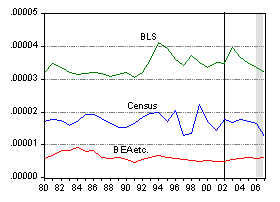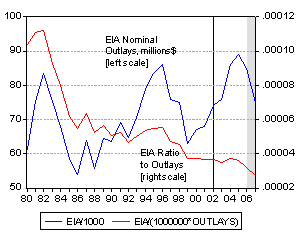Are we adequately funding knowledge about the economy?
In almost all the posts that I write, I rely upon some sort of either Federal or international agency-generated numbers. The trade figures come from the Bureau of Economic Analysis (BEA) and Bureau of the Census at Commerce, the NIPA series from the BEA, the import and export price figures from the Bureau of Labor Statistics (BLS) at the Department of Labor.
With the Census Bureau threatening to terminate an important survey due to budget constraints (hat tip to Economist’s View), I thought it would be useful to see how much we spend gathering these figures on our 12 trillion dollar plus economy (keeping in mind that I do not have a firm grip on the intricacies of Federal budget accounting, so I may make some missteps). The first figure shows a time series for nominal outlays for the Bureau of the Census (excluding the once-per-decade censuses), for other statistics gathering at Commerce (what I presume is the BEA), and the BLS, all in millions of dollars per fiscal year. (The gray shading is the President’s budget proposal for FY 2007.)

Figure 1: Nominal expenditures, in millions of dollars, fiscal years. Source: Federal Budget, FY 2007.
Of course, outlays of the U.S. government have been increasing over time, so it might be useful to normalize by total Federal outlays (CBO figures, FY 2006 and FY 2007 total outlays are February projections from CBO).

Figure 2: Ratio of expenditures to total Federal outlays. Source: Author’s calculations based on Federal Budget, FY 2007 and February CBO Outlook)
I also thought it might be interesting to see how these expenditures have varied with the size of GDP.

Figure 3: Ratio of expenditures to nominal GDP, fiscal years. Source: Author’s calculations based on Federal Budget, FY 2007 and February CBO Outlook)
None of the foregoing can really answer the question posed in the subtitle. The cost of skilled/educated labor necessary to gather and analyse the data is going up faster than the overall CPI, but the cost of information and communication technology is going down rapidly. Overarching this discussion is the increasing complexity of the U.S. economy and the interactions with the rest-of-the-world. As many of the previous posts have highlighted, many of the statistics we currently have now are not up to the task of tracking the economy. Consider for instance determining what has happened with regard to outsourcing of service jobs to India. A recent (Oct. 2005) GAO report concluded:
We are recommending that the Secretary of Commerce direct BEA to
systematically expand its sources of information for identifying firms to survey. BEA should consider ways to improve its identification of the appropriate survey forms to send to firms and the information requested about services imports, particularly with regard to affiliated imports…
Clearly, implementing such recommendations would not be costless. And that’s just India.
As a parting shot, here is the graph for nominal outlays and the share of total government outlays for the Energy Information Administration. Given that we’re facing challenges in the energy arena, you might think that expenditures are rising. You would be wrong.

Figure 4: Outlays of the Energy Information Administration (in millions) and Ratio of expenditures to total government outlays, fiscal years. Source: Author’s calculations based on Federal Budget, FY 2007 and February CBO Outlook)
(By the way, I’ve omitted other data gathering agencies, like the agencies at the Department of Treasury that collect, for instance, the TIC data. See this article for a discussion of the various statistics gathering agencies.)
Of course, just having the numbers is not enough (although it would be helpful). So in a future post, I’ll try to draw out what has happened to Federal spending on understanding the economy and the world. (This task is complicated by the changes in the accounting for spending by, for instance, the Council of Economic Advisers, the Office of Science and Technology Policy, just in the Executive Office of the President, so this might take a while.)
Technorati Tags: economic statistics,
Bureau of Economic Analysis,
Bureau of the Census,
Bureau of Labor Statistics
The strain of populist Know-Nothing-ism in American politics is a sturdy one. Policy makers in the Bush Administratiohn don’t want to be distracted by inconvenient facts.
In the 90s the Gingrich led Contact with America (which heralded the new Republican majority in Congress) included the vow to abolish the entire Departmment of Energy (and Education and Commerce). The EIA budget took a hit then too.
Congress at that time abolished its science and technology advisory body, the Office of Technology Assessment.
There is no adjustment for productivity improvement. The costs of data collection and analysis are several orders of magnitude cheaper today than in 1980.
Thanks for posting on this. The maze of government statistics can be really daunting, even when you know what you’re looking for. The positive externalities of providing these data are enormous, both through directly informing real investment decisions, and indirectly through their impact on financial-market directed resource allocation. It’s hard to argue that these government data collection and analysis efforts are not underfunded.
I see no reason for the Federal government to tax me to support your hobby. If economists want this, or any other data, let them pay for it. I am sure that if it is worthwile, their customers, who include banks and securities dealers, can afford it.
The real problem is that the data collection resources have not allowed the system to change along with the economy. We still have great detail about old, declining industries like textiles and steel while we barely have information on the rapidly growing high tech industries. The data collection agencies are trying to change with the economy, but often they are not allowed to drop the detailed coverage of old industries and reallocate the resources to covering new industries.
Robert,
To the extent that having this data allows organizations to make choices that affect all of us in positive ways, there is a good case for the government to provide it. There is a strong externality component to the production of these statistics, so it is unlikely that a private market could provision the production of economic data optimally.
This “hobby” of economists is concerned with improving human welfare. I do not have a problem with the government subsidizing such hobbies.
Adam
It could just be because I’m a bad web-researcher (hobbyist), but I’ve tried once or twice to find national figure on US homelessness. I found none.
So maybe it’s interesting to note which things the government wishes to count most carefully, and which things it does not.
My guess would be that there is a value network between the financial industries and the government agencies involved.
Robert Cote: You are correct in observing that there is no explicit correction for technological advances in my normalizations. I make two observations.
1. I attempted using the Education and Communications component of the CPI series, which begins in 1994, to see whether I would get a different answer by deflating by the Core CPI and this index which should pick up the rising relative price of services and the declining price of Information and Computing and Telecommunications (ICT) services. Surprisingly, from fiscal year 1994 to fiscal year 2005, both the Core CPI and the CPI-education and communications subindex rise by amount the same amount (25.1% and 25.0%, respectively, in log difference terms).
Additional insight can be gleaned by what other authors have used to deflate R&D expenditures into real terms. Fraumeni and Okubo (2002) rely upon a deflator based upon that used in Carson, Grimm and Moylan (SCB, 1994). That paper observed that the labor component was about 45% of total expenditures, suggesting the ICT component which is experiencing the decline in quality-adjusted price is probably applicable to less than half of the total index. Since the price index for private fixed investment in equipment and software (NIPA Table 5.5.4) has declined by about 20% to 2004, and the employment cost index for all government workers has increased by about 44% to 2005, my guess is that the appropriate price index for these types of services has risen despite technical advances in computing and communications.
2. The mandates for data collection have risen, as have demands for timeliness. Hence, the constant units criteria might not be right.
Robert Schwartz: I doubt that the private sector would be able to collect all the data. For instance, private firms are willing to give data to the Government on assurance that proprietary data remain secret (this pertains to manufacturing census, data on international trade, foreign direct investment, for BEA alone; then think about the oil stocks data that the EIA collects). So I admire your faith, but I doubt the persuasiveness of your argument. By the way, there is a wealth of theoretical work that demonstrates that private individuals and firms may underinvest (relative to the Pareto optimum) in gathering information.
PS: When I was working in the Executive Office of the President/CEA, we paid close attention to these numbers, as I expect they do now. Does that still constitute a hobby?
Menzie Chinn,
I was vaguely aware of the Carson, et al study. Meaning I probably once knew of it and agreed enough to integrate it into my worldview. I guess my comment was double edged. Data collection costs have fallen so much I don’t know how to measure them. The charts start in 1980. How many research hours in 1980 would it take to answer any of the 90% of all questions that can be answered with a 30 second BLS/Census web inquiry today? We get better data, for sure but we also get tens of thousands more datums as well. Cost per unit is 10s of thousands to millions of times cheaper in absolute cost and another order of magnitude inflation adjusted and throw in quality and timeliness and we could arguably be in the billions.
As juvenile as it may seem I can only be drawn to the Eddie Murphy, Dan Ackoryd movie “Trading Places” where a couple of fast thinkers made fortunes with better data slightly faster.
My personal interest revolves around the ability of traditionally slow markets to respond quicker; International fund flows as last months’ record values show and the housng market in particular. Think about 1980 or 1990 and tell me how long it would take for either international investment or housing trends to be produed.
The problem with underfunding government data collection is not that additional useful data aren’t produced. Hedge funds and investment banks spend a great deal of money on research. The problem, from a macro viewpoint, is that these data don’t become public because the people who produce them have an incentive to keep them private. The information becomes partially public, because it gets reflected in securities prices, but the actual data is usually very hard to obtain (just ask any finance academic).
Much of the data the government collects and publishes actually comes from private trade organizations. If you go to the Federal Reserve Board they have a nice summary of how they get much of the data behind the industrial production data.
One intereting example is in the Census orders and shipments data they show shipments for semiconductors, but not inventories, orders or backlogs — much better info for stock market analysis. The reason they do not publish this data is that the private semiconductor trade group that actually collects the data considers it propriety and will not allow the government to publish the data — it is included in more aggregrated data on total orders, etc..
The costs of the government collecting this data is small compared to the costs of implementing a bad policy because you do not have the right data.
Would you want the Fed to implement monetary policy without knowing what inflation or unemployment is?
Spencer,
You’ve put your finger on the key issue–the major cost of not having the right data is that you don’t have the right policy.
What I’ve found over and over again, however, is that most economists will complain about not enough money being spent on economic statistics, but they are *not* willing to admit that we might have the wrong policy as a result.
For example, do we correctly measure the trade deficit, unemployment, GDP, and investment? I suspect that Menzie would say yes, or at least well enough to make good policy. In that case, why spend a lot more?
On the other hand, I think we badly measure these key numbers–badly enough to make incorrect policy decisions. I’d like to see a lot more money devoted to revising and updating the economic statistics.
What we need is “less data” and “less policy.” As I once told my boss’s secretary, who kept nagging me for progress reports, “I’m too busy making progress to waste my time reporting on it.”
I benefit the economy, too. Does that mean you should pay for my groceries?
Does the IRS collect generalized information for economic analysis by other departments and by economists?
Hey Mike,
If you want “less data,” then why are you reading an economist’s so-called hobby blog to begin with?
Sam
Ah Sam, would that be Robert Swartz?
Mike sounds so..reasonable and thoughtful.
[But you Swartzie, is this your new hobby? Well? Squeak up you weanie? Afraid to post some real data? Huh?]
One of the useful roles of the Federal government is to collect and collate data. “Newty’s” contract on America was just a first salvo against sanity in the USA. At the behest of gnut, the Gov dissolved the DOI Bureau of Mines which had a budget of ~ 120 MM / year. We now spend ~ 250 MM / year (DOE DOC) to obtain 1/3 of the information and none of the research.
Let’s really save some money and get rid of the Dept of Homeland Security.
I can see some benefit from Robert Schwartz’ implicit argument that govt. data should be sold by the government insofar as it *might* provide higher revenues for the govt. organizations that produce the data and might induce them to present data in ways most useful to those who most need it. My problem is that while I can reasonably accept people paying the government for a “service” it provides, I do not like any kind of barrier to access to “information.” Compiling statistics happens to be a slippery combination, but I think the information aspect should win out in an open democratic society.
I at first was thinking that a solution might be to provide a “Cliff’s notes” version of statistics for free and then offer more complete versions for a fee, but I then decided the principle outweighs whatever little gains might be made from this method.
What the hell is the difference if the data is misrepresented, misreported, and muffled.
Watching the fiasco surrounding the “facts” of the port deal has been an eye-opener. The whole thing is a cartoon, from the Congressional hearings to the news media to the blogs.
I watched the whole thing to see how information is handled; I was less concerned with the arguments pro and con.
Occasionally someone gets the facts straight. But the herd follows the illusion, listens to the echo chamber.
It is nice and proper to assume that if government does not do basic research the private sector well. It won’t. Basic medical research is funded by the government and on this the drug companies build. This is true in every sector. Bell Labs once had Nobel prize winning research, but not much money left. IBM retains quite a bit of capacity, but the economics at least short term are against this choice. Companies which don’t do the science have more money to play with, they are supporting less massive bureacracies and are leaner. And to the extent knowledge is taken over by the private sector then it today’s world the more likely it will be kept private.
Again we must look at these allegedly free market claims like the one made above and see that they are actually a desire to restore feudalism with stagnant structure and entrenched protected economic realms.
Can M3 be Saved?
I always find it curious when a good source of public data gets cancelled by an administrative source. Mass layoffs were the first victim, killed by the White House in 2003. Next came the proposed ending of funding for a Census Bureau survey on the eco…